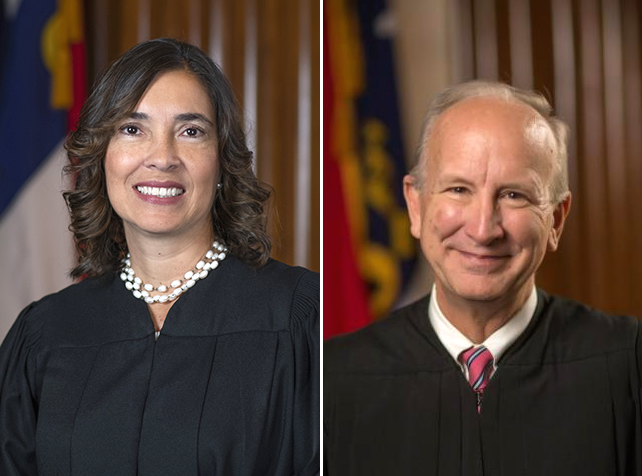North Carolina Supreme Court finally addresses racism in the jury box

North Carolina Supreme Court Justice Anita Earls (left) penned a recent ruling against prosecutors on a claim of discrimination against black jurors. Justice Paul Newby (right) was the lone dissenter. (Official court photos.)
For decades, North Carolina courts ignored evidence that black people were less likely to serve on juries due to prosecutors' actions. But on May 1, the state's Democratic-controlled Supreme Court finally ruled in favor of a black defendant who argued that prosecutors rejected too many potential black jurors from hearing his case. It was the only high court in the South that had not yet dealt with the problem.
Cedric Hobbs was convicted of murder in 2014 by a jury in Cumberland County, where statistics showed that prosecutors were more likely to strike black people from juries. Hobbs' lawyer pointed this out and also argued that prosecutors in his case offered justifications for removing black jurors that they didn't apply to white jurors.
The high court sent the case back to the trial court for a new hearing. The justices noted that prosecutors used eight of their 11 challenges against black jurors. "Neither the trial court nor the Court of Appeals appropriately considered all of the evidence necessary to determine whether Mr. Hobbs proved purposeful discrimination," the decision said.
The justices are also hearing a lawsuit over the Republican-led state legislature's repeal of the Racial Justice Act, a law passed in 2009, when the legislature was under Democratic control, that required judges to commute death sentences if the defendants offered evidence that prosecutors discriminated against black jurors. Four people on North Carolina's death row had their sentences commuted under the law; like Hobbs, they were sentenced in Cumberland County, a military community where 40 percent of the population is black. The legislature repealed the law in 2013.
Since the U.S. Supreme Court's 1986 ruling that racism in jury selection is unconstitutional, statistics have proven that this discrimination was occurring in North Carolina. But until this month, the North Carolina Supreme Court* state's appellate courts had rejected every argument from a black defendant arguing bias in jury selection.
James Coleman, a Duke law professor, called the ruling a "message that courts across North Carolina must vigorously investigate the reasons why jurors of color are excluded, not simply rubber stamp the prosecutor's strikes."
Justice Paul Newby, the seven-member court's only Republican, dissented from his colleagues' decision. He argued that "the trial court appropriately considered the evidence … and held that the State did not intentionally discriminate" when choosing the jury that convicted Hobbs.
In a 2019 book about the conservative tea party movement, ethnographer Bill Westermeyer quotes Newby speaking about race and criminal justice to a tea party group in October 2011. At the time, Newby was campaigning for re-election, and he received a question about when the state would begin executing death row inmates again. Newby criticized the Racial Justice Act for effectively halting executions:
Now the problem is that you have this Racial Justice Act…. It's as if race were relevant to any of this. I have discussions with people who say that there are too many black people in prison. I don't disagree with that, there are. But they are not there because they are black. They are there because they committed a crime.
Westermeyer says the audience "loudly" agreed.
In his dissent, Newby cited precedents calling for deference to trial courts on these issues and argued that the judge had sufficiently weighed the historical evidence of racism in jury selection. Newby also said the majority's decision relied on arguments that weren't offered by Hobbs' lawyers.
The majority said the Court of Appeals had accepted prosecutors' justifications solely because courts in other cases had accepted similar reasons as "race neutral."
The court's decision was authored by Justice Anita Earls, a former civil rights attorney who had advocated for the Racial Justice Act. Earls was elected to the high court in 2018, despite the Republican-controlled state legislature passing a series of laws intended to handicap her campaign. GOP lawmakers also tried to manipulate the 2016 high court election to prevent the voters from choosing a progressive majority, but that law was struck down.
Three Supreme Court seats are on North Carolina's ballot this year, and Newby is challenging Chief Justice Cheri Beasley — who made history as the court's first African-American woman chief justice — for the leadership position.
*This article was edited to reflect the fact that the North Carolina Court of Appeals has ruled in favor of a black defendant on the issue of discriminatory jury selection.
Tags
Billy Corriher
Billy is a contributing writer with Facing South who specializes in judicial selection, voting rights, and the courts in North Carolina.
